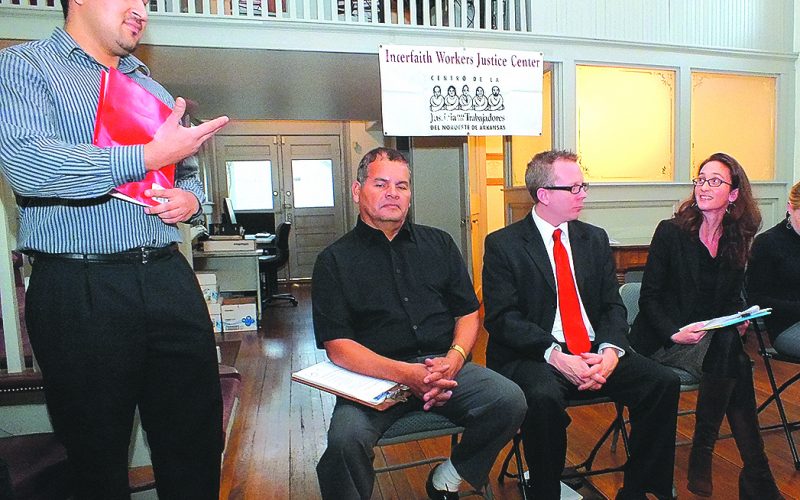
Photo By Jose Lopez
From left: Jose Luis Aguayo (executive director of Workers’ Justice Center), Rafael Escobar (indignant worker), Attorney Daniel Faulkner with the Arkansas Department of Labor, and Attorney Annie Smith discuss the various ways employers exploit employees by withholding wages, at a wage theft forum Fri., Feb. 22 in downtown Fayetteville.
By Terrah Baker
The Arkansas Department of Labor has a different name for what activists at the Springdale-based Northwest Arkansas Workers’ Justice Center call “wage theft.”
“We actually call it wage claims, and they often deal with a one-time occurrence of someone not receiving minimum wage or overtime pay,” said attorney with the ADL David Faulkner. “They can get large because they balloon up over the years.”
But the most disturbing cases that members of the WJC see deal with deliberate theft of wages from fringe groups of society; mostly women and racial minorities. For instance, explained WJC member Ana Aguayo, women are 56 percent more likely to have their wages stolen than their male counterparts.
Faulkner said there are some common reasons why employers have denied workers throughout Arkansas thousands of dollars in earned income.
“Some employers who aren’t paying employees aren’t solvent themselves; some actually intend not to pay and they move,” he said.
In both cases, and in the others Faulkner has seen, there are major issues when trying to claim wages from the employer; like the employer has packed up, left the state and can no longer be contacted, even though they may be operating a new business in a neighboring state.
Also, he said, employers who aren’t paying employees usually don’t keep good records, so it becomes a case based on personal testimony; cases hard to prosecute with real results. Employers often try to claim that a worker owes them for stolen items or borrowed money — something Faulkner said happens, but is also hard to verify.
Last year, Faulkner’s office processed 373 claims from Arkansas workers and collected $42,000 from employers. Executive Director of the WJC, Jose Luis Aguayo, spoke of a case that happened in Northwest Arkansas where in the restaurant Osegueras/Celi’s, $147,000 in wages went unpaid to workers, but not enough evidence was present to obtain the money owed.
“These are people in our communities who are going home without the money they need to feed their families and pay their bills,” Ana said. “They aren’t getting minimum wage, no overtime and workers are going home penniless with no options.”
Some employers threaten employees who try to seek stolen wages with going to the cops or deportation.
“They will tell the workers they know where their family lives,” said Jose.
Attorney Annie Smith said this is a common problem across the country that’s having an impact on local economies.
“If an employer is not paying wages, then they’re not paying taxes, the proper withholdings; then the employee can’t pay rent, buy food, and it affects the whole economy,” she said.
Luckily, she said workers can take action through organizations like the WJC and through their own personal habits — like recording their hours and days worked, keeping a record of their bosses address, license plate number and any information they can gather.
What Ana and Jose want is for more strict laws to be passed in Arkansas that hold consequences for employers who withhold earned wages from their employees.
“There are still cases from the 1950s and 1960s that haven’t been charged. Now, there are even more, easier loop holes for [employers] to get through,” Jose said.
Smith explained that more strict laws are being passed around the country that protect the rights of workers.
“In Chicago, the city now has the right to revoke or refuse a business license to a business who doesn’t pay their workers,” she explained.
To learn more about wage theft and ways to avoid it or help end it in NWA, contact the Northwest Arkansas Workers’ Justice Center at (479) 750 8015.



